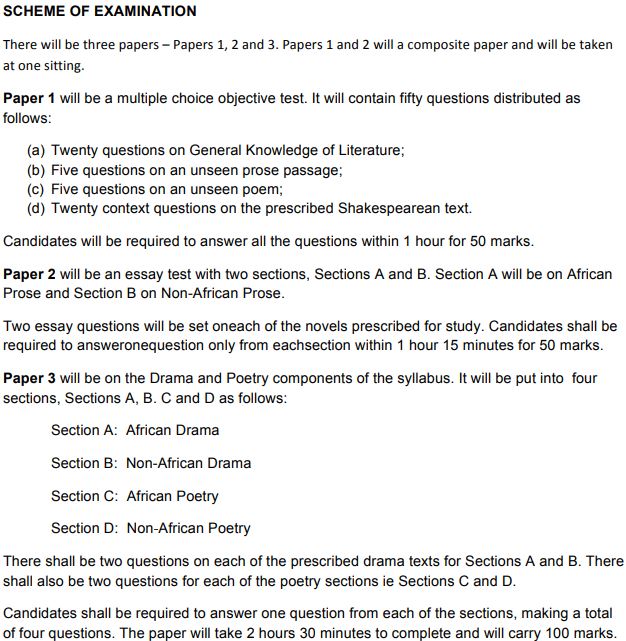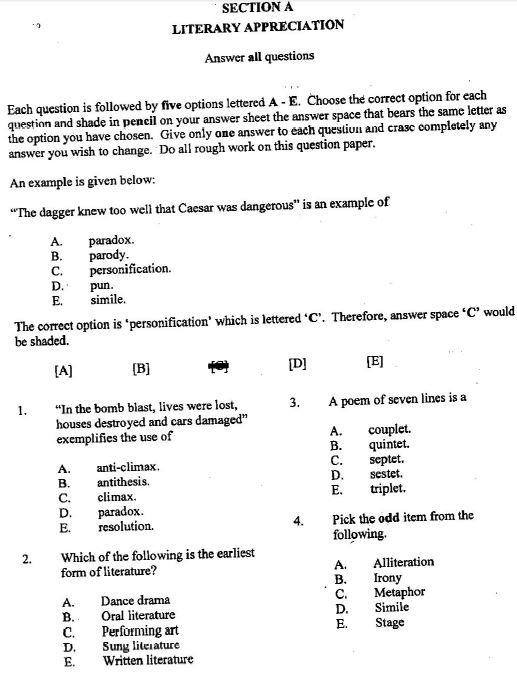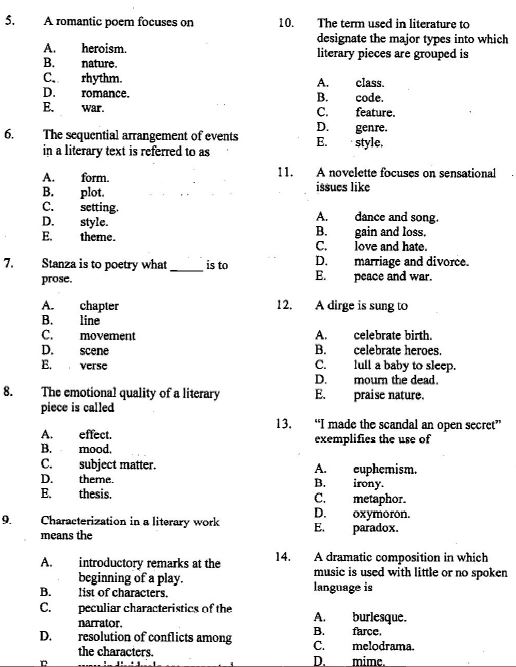Table of Contents
WAEC Literature In English Questions and Answers 2020
The West African Examination Council (WAEC) Literature-In-English papers will be written on Friday, 21st August, 2020.
In case you forgot, there are three papers in Waec English Literature – Papers 1 & 2 and then 3, all of which must be taken on their assigned dates.
Paper 1 & 2 (Objective and Prose) is a combined paper which was taken at one sitting from 9:30 am to 11:45 am while Paper 3 (Drama and Poetry) will be written from 3:00 pm to 5:30 pm which marks the end of the WAEC Literature in English exam.

In this post is samples of Waec literature in English questions for candidates that will participate in the 2020 examination. Read down below to see WAEC Literature-in-English questions.
Note that below is the questions from Waec literature past questions and answers syllabus that we feel are likely questions for SSCE preparation.
WAEC Literature Answers 2020 for Prose and Objectives:
PAPER 2 (Prose)
Answer ONE question only from each section.
Write your answers on the answer booklet provided.
SECTION A (African Prose)
Amma Darko – Faceless;
1. Examine the the role and significance of Slyv Po in the novel.
2. Show how women are discriminated against in the novel.
Bayo Adebowale – Lonely Days
3. What impression do you form of Yaremi in the novel?
4. Examine the attitude of Kufi people towards death in the novel.
SECTION B (Non-African Prose)
Richard Wright – Native Son;
5. What are Bigger’s reasons for his bitterness against the white man in the novel?
6. How does the media respond to the disappearance of Mary Dalton in the novel?
Horace Walpole – The Castle of Otranto;
7. Comment on the issue of male dominance in the novel,
8. What does Theodore’s encounter with Isabella in the cavern in the forest reveal about his character?
PAPER 1 (Objective)
Answer ALL questions in this section.


15. ________ in my rate” means
A. i’m very certain
B. so far as I can see
C. there’s no doubt
D. as it appears.
16. A poem that describes the simple life of rural people is called _____
A. eulogy
B. ode
C. lyrics
D. pastoral.
17. Choose the option that has the same consonant sound as the one represented by the letter(s) underlined
Vice
A. cat
B. dress
C. show
D. chalk.
18. In literature, repetition is used essentially for
A. rhyme
B. suspense
C. allusion
D. emphasis.
This question is based on Bayo Adebowale’s Lonely Days.
19. The cap-picking ceremony is to
A. break the strong will of Yaremi
B. make Yaremi remarry
C. establish that she is wicked
D. prove that Ajumobi is not the best
20. A Poem that celebrates an object, person or event is
A. a sonnet
B. a dirge
C. an ode
D. a balled.
21. _______ In literature is the sequential arrangement of events in a creative work.
A. Cast
B. Summary
C. Flaw
D. Plot.
This question is based on Frank Ogodo Ogbeche’s Harvest of Corruption
22. Who impregnated Aloho?
A. The Commissioner
B. Chief Haladu
C. Justice Odili
D. Inspector Inaku.
This question is based on Faceless by Amma Darko
23. What is the reason that caused Odarley’s mother to send him away from home?
A. she chose to go to the street
B. her mother remarried
C. she steals her mother things
D. she wants to poison her boyfriend.
Read the extract and answer the question
X: We two, my lord.
Will guard your person while you take take your rest, And watch your safety.
Y: Thank you – Wondrous heavy .
(Act II, Scene One, lines 184 – 187)
24. The ”two” later plot to
A. kill all the other characters
B. escape from the island
C. kill Prospero and Miranda
D. kill Alonso and Gonzalo.
25. Carrying a heavy bundle of tightly wrapped bits and pieces of junk drooping over his face”.
The excerpt above exemplifies _______?
A. Irony
B. synedoche
C. symbolism
D. euphemism.
26.
WAEC Literature Drama and Poetry 2020:
PAPER 3 (Drama and Poetry)
Answer ONE question only from each section.
Write your answers on the answer booklet provided.
SECTION A (African Drama)
Dele Charley – The Blood of a Stranger.
1. How does love for wealth and power influence the actions of the characters in the play.
2. Examine Wara’s role in the development of the plot.
Frank Ogodo Ogbeche – Harvest of Corruption.
3. Consider Aloho as a foil to Ogeyi
4. How does Chief Haladu Ade-Amaka manipulate justice to his own advantage?
SECTION B (Non-African Drama)
Lorraine Hansberry – A Raisin in the Sun.
5. To what extent are the dreams of the Younger family fulfilled in the play?
6. Dicuss the living conditions of the Younger family.
Goldsmith – She Stoops to Conquer.
7. Compare the relationship between Tony and Constance with that between young Marlow and Kate
8. What makes Mr. Hardcastle a humorous character?
SECTION C (African Poetry)
9. Relate the tittle of the poem Ambush to the theme of frustrated dreams.
10. Comment on the poets’s use of imagery in The Dinning Table.
SECTION D (Non-African Poetry)
11. Comment on Birches as a descriptive poem.
12. Examine the relationship between God and man in The Pulley.
Waec Literature Books – Reading Text from 2020 SSCE Syllabus:
African Prose
- Amma Darko – Faceless
- Bayo Adebowale – Lonely Days.
Non-African Prose
- Richard Wright – Native Son
- Horace Walpole – The Castle of Otranto
- Patience Swift – The Last Goodman
- *William Shakespeare – OTHELLO.
Non-African Drama
- Oliver Goldsmith – She Stoops to Conquer
- Lorraine Hansberry – A Raisin in the Sun.
African Drama
- Frank Ogodo Ogbeche – Harvest of Corruption
- Dele Charley – The Blood of a Stranger.
African Poetry
- Birago Drop – Vanity
- Gbemisola Adeoti – Ambush
- Gabriel Okara – Piano and Drums
- Gbanabam Hallowell – The Dinning Table
- Lenrie Peter – The Panic of Growing Older
- Kofi Awoonor – The Anvil and the Hammer.
Non-African Poetry
- Alfred Tennyson – Crossing the Bar
- George Herbert – The pulley
- William Blake – The School Boy
- William Morris – The Proud King
- Robert Frost Birches – Birches
- William Shakespeare – Shall I compare thee to a Summer’s Day?

